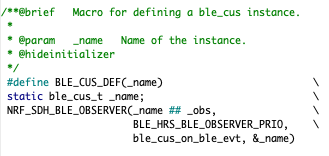I've worked through the Custom BLE Service example (https://github.com/NordicPlayground/nRF5x-custom-ble-service-tutorial) and I'm attempting to port it to C++ to form the foundation of my own application. However, I've been immediately hit with errors when trying to compile as C++ as opposed to C.

I believe that the issue has something to do with the macro which defines a ble_cus instance

As all of the errors seem to relate to the compiler seeing m_cus as of type ble_cus_s as opposed to ble_cus_t. Is there an inherent difference as to how forward declaration works in C++ compared to C? Or am I missing something else here?
To replicate:
Take the program created by the tutorial (https://github.com/NordicPlayground/nRF5x-custom-ble-service-tutorial), change main.c to main.cpp


